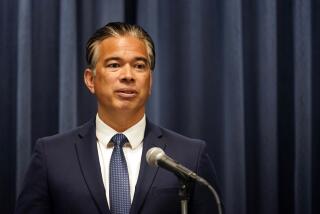Lehman Disputes Charges About First Alliance
- Share via
The long-awaited legal battle between embittered customers of First Alliance Corp. and Lehman Bros., the Wall Street firm that bankrolled the now-defunct Irvine lender, got underway in earnest Tuesday as lawyers traded charges about First Alliance’s business practices -- and how much Lehman knew about them.
In opening arguments of what is expected to be a three-month trial in federal court in Santa Ana, attorneys for Lehman rebutted charges that First Alliance, with Lehman’s backing, had operated a loan “sweatshop” that preyed on the elderly and other vulnerable homeowners, pressuring them to refinance mortgages and hitting them with exorbitant fees.
Lehman attorney Helen Duncan said First Alliance had cleaned up its practices by the time the investment bank decided to bankroll its lending operation, and that the company had helped thousands of borrowers who otherwise would have lost their homes or failed to qualify for loans.
The plaintiffs alleged in their lawsuit that First Alliance was a renegade operation under the scrutiny of attorneys general in seven states, the AARP and a previous group of borrowers who claimed they had been suckered by high-pressure sales tactics.
First Alliance filed for bankruptcy protection in 2000 amid a flurry of civil suits. Last year, the firm finalized a settlement with private plaintiffs and the Federal Trade Commission that returned about $75 million to borrowers and their lawyers. However, the firm never admitted wrongdoing.
Much attention has been focused on internal Lehman criticism of First Alliance’s business practices.
But much of that criticism, Duncan said, was by one member of a “deal team” that investigated First Alliance’s operations.
The Lehman executive, Eric Hibbert, described First Alliance in a memo to other Lehman officials as the “used-car salesman” of sub-prime lenders. Until the time Lehman had agreed to finance First Alliance, it had dealt with only prime lenders -- whose customers generally are judged to be good credit risks -- and not sub-prime lenders that cater to riskier borrowers, Duncan said.
“Mr. Hibbert only dealt with prime lending,” she said. “He didn’t like sub-prime [lenders] because they were aggressively targeting borrowers ... and he wrote a memo about it.”
Duncan told jurors that Hibbert’s comments were made during a review in 1995. When Lehman decided to fund the firm in late 1998, First Alliance had turned around, she said.
Among other changes, she said, First Alliance had hired a new manager, had met all legal criteria for lending disclosures and had received favorable rankings from independent evaluators.
The case is being argued before U.S. District Judge David O. Carter. The plaintiffs are seeking hundreds of millions of dollars in actual and punitive damages from Lehman.
Plaintiffs’ attorney Richard F. “Dickie” Scruggs told the jury that First Alliance used sales techniques that were “cunningly deceptive.” Its lending managers were veterans of sales, not financing, and followed a 12-step “track” in pitching loans over the telephone.
“This track was akin to a playbook for a football team,” Scruggs said. “People would need to be trained on when to hold and when to clip. It doesn’t say lie and cheat in the track. That’s what you learn in training.”
Scruggs told jurors that First Alliance salespeople targeted the “vulnerable and unsophisticated.” They often were elderly homeowners who had heavy debts. They were sought after because their homes would be used as collateral.
As his first witness, Scruggs called Terrence La Frankie, a former First Alliance loan officer. La Frankie, a former car salesman, said 95% of the firm’s loan officers were from the automobile industry and were selected for their ability to close deals quickly -- preferably after a single meeting.
“The motto for one-call closers is ‘There’s no greenbacks in be-backs,’ ” La Frankie told the jury. “All they wanted at First Alliance, I learned real quick, was players. They wanted the creme de la creme.”
More to Read
Inside the business of entertainment
The Wide Shot brings you news, analysis and insights on everything from streaming wars to production — and what it all means for the future.
You may occasionally receive promotional content from the Los Angeles Times.











